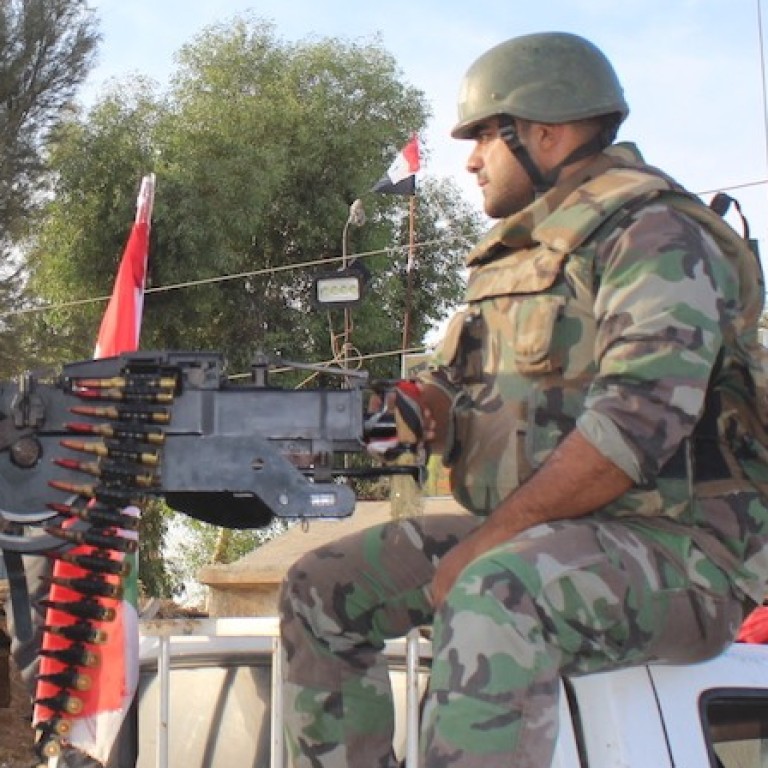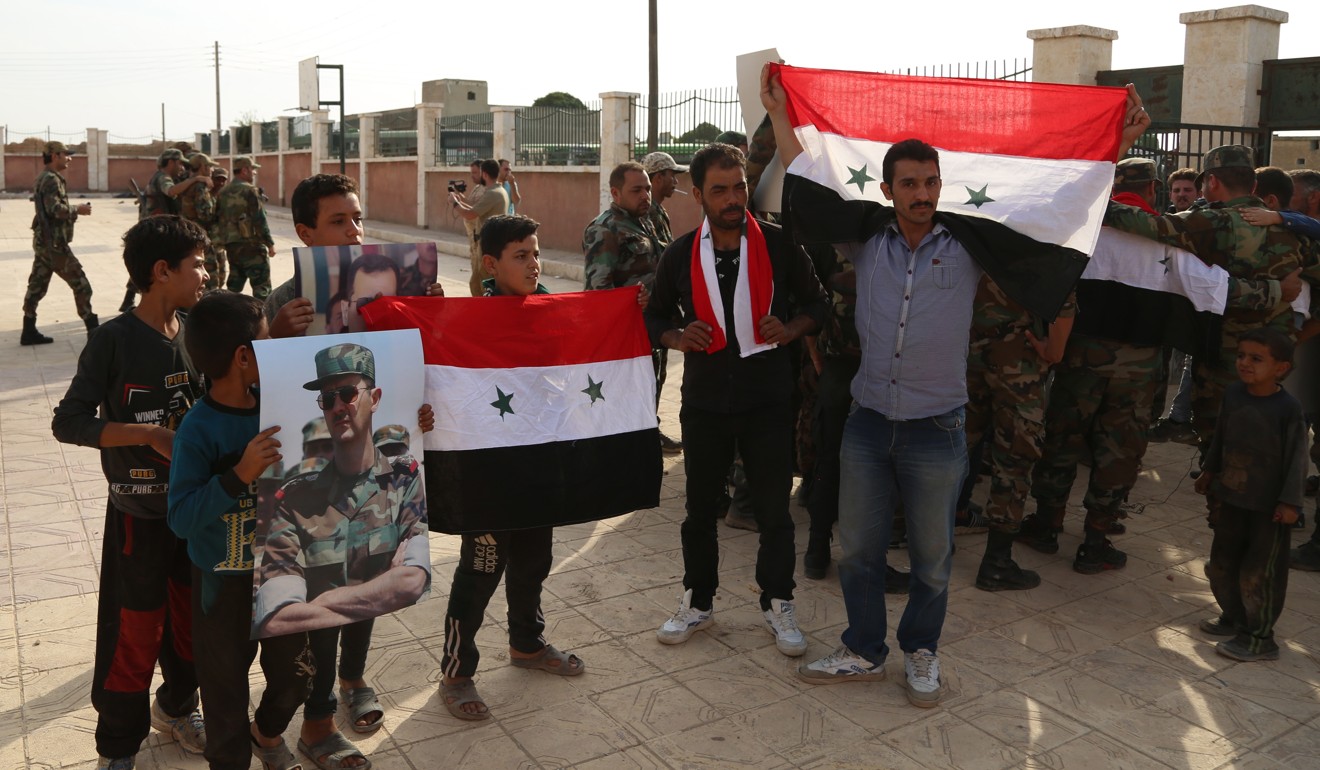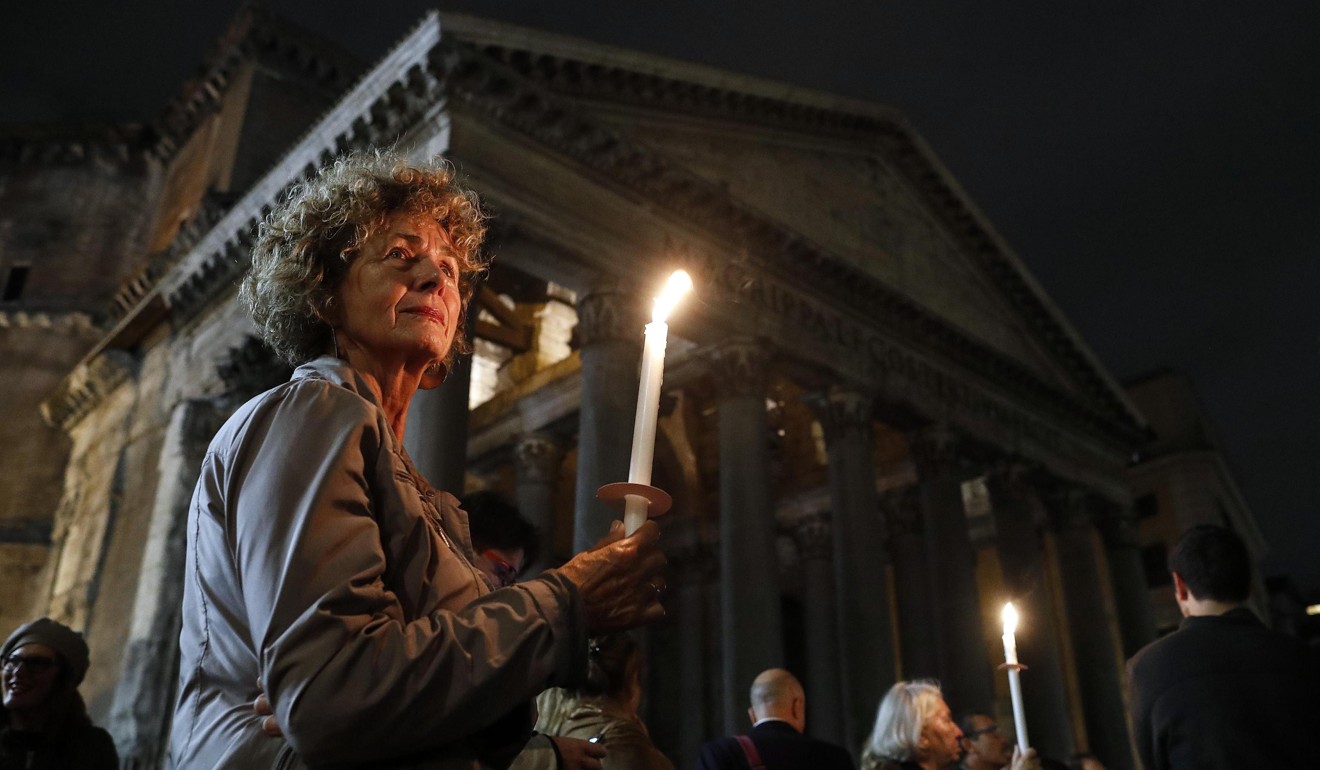
Mike Pence and Mike Pompeo heading to Turkey as Russia moves to fill Syria void left by US
- US vice-president to press Erdogan to halt offensive against Kurdish fighters
- Moscow says Russian troops are patrolling front lines between Turkish and Syrian army positions to keep them apart
US Vice-President Mike Pence and Secretary of State Mike Pompeo will travel to Ankara on Wednesday to press Turkey to halt its offensive against Syrian Kurdish fighters, President Donald Trump said on Tuesday.
“They are leaving tomorrow,” Trump told reporters at the White House, a day after Pence announced the trip, without giving a timetable.
“We are asking for a ceasefire … We put the strongest sanctions that you can imagine.”
Trump’s comments came as Russia moved on Tuesday to fill the void left by the US in northern Syria, deploying troops to keep apart advancing Syrian government forces and Turkish troops.
Pence’s office released a separate statement adding that he would “voice the United States’ commitment to reach an immediate ceasefire and the conditions for a negotiated settlement”.
Pence is expected to meet Turkish President Recep Tayyip Erdogan on Thursday, the statement added, to reiterate Trump’s commitment to “punishing economic sanctions” on Turkey until a resolution is reached.
The president’s abrupt decision this month to withdraw US forces from northeast Syria left the Kurdish-led Syrian Democratic Forces (SDF) at the mercy of Turkish troops and their Syrian proxies.
The Kurds say hundreds of imprisoned relatives of militants from the Islamic State group – also known as Isis – have escaped since Turkey launched its assault last week, although Trump suggested the SDF may have deliberately released them to gain leverage.
‘Isis version two’: Malaysia, Indonesia fear return of fighters jailed in Syria
Now in its seventh day, the Turkish offensive has caused tens of thousands to flee their homes, upended alliances and is redrawing the map of northern Syria for yet another time in the eight-year-old war.
Russia moved quickly to further entrench its role as a power broker after Trump’s pull-out. Desperate for a new protector, the Kurdish administration struck a deal with the Russia-backed government of Syrian President Bashar al-Assad, whose forces on Sunday began moving into Kurdish-administered areas to shield them against Turkey.
Syrian troops waved flags after they rolled into Manbij, a flashpoint town west of the Euphrates River that Turkey had been aiming to capture and wrest from Kurdish control. Video by Russian journalists with the troops showed what appeared to be an abandoned outpost where US forces had been stationed.
A US military spokesman, Colonel Myles B. Caggins, confirmed US troops had completed their pull-out from Manbij. During the withdrawal, contacts were kept open with the Turks and Russians to ensure the several hundred American forces there got out safely, US officials said.

US troops have had outposts in Manbij since 2017, when they went in to avert a battle over the town between Turkish and Kurdish fighters.
Now Russia is playing that role. Outside Manbij, Russian troops patrolled front lines between Turkish and Syrian army positions to keep them apart, Russia’s Defence Ministry said.
“No one is interested” in fighting between Syrian government troops and Turkish forces, said Alexander Lavrentyev, Moscow’s envoy for Syria. Russia “is not going to allow it”, he told Russian state news agencies.
Kelly Craft, the US ambassador to the United Nations, told reporters Washington is “deeply concerned” that Russian troops are patrolling between the two sides.
Pro-Turkey rebels ‘executed’ 9 civilians in Syria, monitor claims
Russian Defence Minister Sergei Shoigu spoke to US Defence Secretary Mark Esper to discuss “issues of mutual interest in the context of situation in Syria”, the Russian Defence Ministry said in a brief statement, without elaborating.
Russia has been a staunch ally of Assad for decades and entered the Syrian conflict in 2015, providing air power that eventually turned the tide of the war in his favour. The Russian military has shipped weapons to Damascus, trained thousands of troops and put its advisers in key Syrian military units.
In the first week of the Turkish assault, at least 154 fighters from the Kurdish-led Syrian Democratic Forces have been killed, as well as 128 fighters from Turkish-backed Syrian factions, according to the Syrian Observatory for Human Rights, a monitor of the war.
It said at least 69 civilians have been killed in Syria. Turkey says six of its soldiers have died, as well as at least 20 Turkish civilians killed by Kurdish mortar fire across the border.

Despite the Syrian and Russian deployments, Turkey insisted it would capture Manbij. Asked on Sky News if Turkey’s military was willing to fight Assad’s army, Vice-President Fuat Oktay said: “We hope it’s not going to happen, but again we are determined to get control over Manbij.”
A US official said the around 1,000 US troops being withdrawn from northern Syria will reposition in Iraq, Kuwait and possibly Jordan.
The US forces in Iraq could conduct cross-border operations against Isis in Syria as they did before creating the now-abandoned partnership with Syrian Kurdish-led forces, the official said, speaking on condition of anonymity to discuss sensitive planning for a US pull-out.
After opening the way for the Turkish assault with its pull-out, Washington is now trying to restrain its fellow Nato member.
Thousands in Europe march against Turkey’s Syria offensive
Trump on Monday announced sanctions aimed at Turkey’s economy. The US called on Turkey to stop the offensive and declare a ceasefire, while European Union countries moved to broaden an arms sale embargo against their easternmost ally.
The UN Security Council planned a closed meeting on Wednesday on the situation, requested by Germany and other EU members.
“Everybody hopes that … we can do something to bring back the parties to the peace process,” said the current Security Council president, South Africa’s UN Ambassador Jerry Matjila.
Nato ambassadors also will meet on Wednesday in Brussels on Turkey’s offensive, said alliance Secretary-General Jens Stoltenberg.

Erdogan defended Turkey’s offensive in a column in The Wall Street Journal, urging the international community to support Ankara’s effort to create what it calls a resettlement “safe zone” for refugees in northeastern Syria, or “begin admitting refugees”.
“Turkey reached its limit,” Erdogan wrote of the 3.6 million Syrians in his country. He said Turkey’s warnings it would be unable to stop refugee floods into the West without international support “fell on deaf ears”.
Turkey said it invaded northern Syria to create a zone of control the entire length of the border and drive out the Kurdish fighters, which it regards as terrorists because of their links to Kurdish insurgents in Turkey. Instead, after the Kurds’ deal with Damascus, a new de facto carving up of the border appeared to be taking shape.
Erdogan threatens to flood Europe with refugees after Syria criticism
Turkish forces control the beginnings of a truncated zone roughly in the centre of the border about 100km (60 miles) long between the towns of Tel Abyad and Ras al-Ain.
Syrian government troops were moving into or increasing their presence in areas on either side of that enclave, including Manbij to the west and the cities of Qamishli and Hassakeh in the far northeastern corner of Syria.
Though they gain protection from the Turks by the deal with Damascus, the Kurds risk losing the virtual self-rule they have enjoyed across the northeast – the heartland of their minority community – ever since Assad pulled his troops from the area seven years ago to fight rebels elsewhere.
Agence France-Presse and Associated Press
